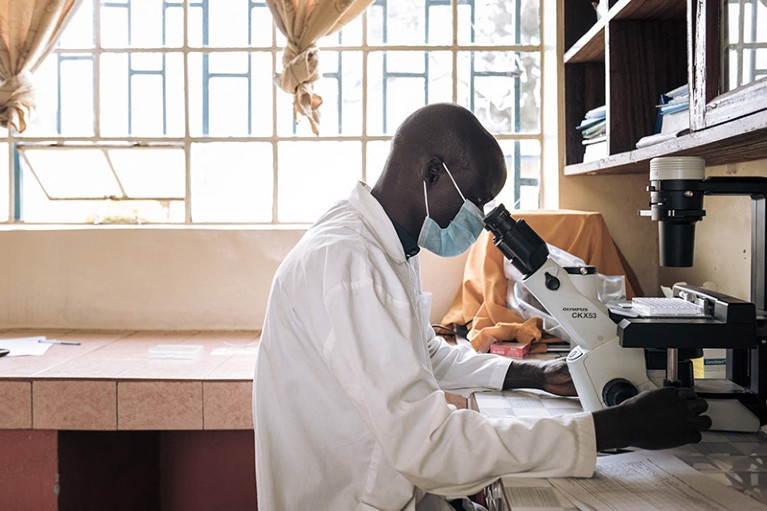
Researchers say that more institutions need to be founded in Africa to rebalance unequal international collaborations.Credit: Alexis Huguet/AFP via Getty
African scientists have long lamented a lack of influence in global scientific collaborations. Researchers from the continent are under-represented in papers on topics, such as malaria, that are especially relevant to Africa. Studies have also shown1 that when African authors partner with colleagues in Europe or North America, this under-representation is reinforced.
Intergovernmental science Organizations (IGSOs) aim to bolster collaborations across borders and could offer one solution to this problem, by giving less developed countries access to resources, information and technological know-how that they might not otherwise have. But not all IGSOs are well placed to help, say social scientists Anna-Lena Rüland at Leiden University in the Netherlands and Nicolas Rüffin at the University of Bonn in Germany.
In a June 2023 paper2, Rüland, Rüffin and their colleagues argue that established IGSOs, such as CERN — Europe’s particle-physics laboratory near Geneva, Switzerland — are too rigid in their ways of working. Instead, newer or fledgling organizations, such as the African Light Source (AfLS), an IGSO that aims to run the continent’s first synchrotron light source3, are where Africans can have influence.
The researchers analysed the roles that scientists from low- and middle-income countries, many of them in the Southern Hemisphere, and rapidly developing countries such as China, India and South Africa, have at four collaborations. These were CERN; the International Thermonuclear Experimental Reactor in St Paul-lez-Durance, France; the Square Kilometre Array (SKA), a radio telescope based in Australia and South Africa; and the AfLS. The team conducted a literature review of papers that describe these IGSOs, along with qualitative interviews with people who work with these organizations.
Older IGSOs have inflexible institutional frameworks that “favour founding members, which are often countries of the global north, and leave little room for manoeuvre for newcomers, including for those from the global south”, Rüland told Nature Index.
For newer bodies such as the AfLS, however, this model is turned on its head. “The aim is African sustainability, development, innovation and ultimately, wealth,” says Simon Connell, a physicist at the University of Johannesburg, South Africa, who is involved with the AfLS. “The project is community-driven. We are in a bottom-up phase, and we have a tremendous footprint in Africa.”
Independence is key
Burgeoning IGSOs in the global south do run the risk that their research priorities could end up being shaped by the global north if the funding comes from organizations outside Africa, Rüland and Rüffin note. However, Connell says that the AfLS will eventually become majority African-funded and therefore better able to resist the priorities of high-income countries.
“We have received only a very modest funding externally, and we are very conscious that our road map is long, as the funding must gradually become dominated by African contributions,” he tells Nature Index.
Connell says that the forthcoming AfLS conceptual design report is developed by Africans and their colleagues abroad, and it clearly articulates Africa-based imperatives. “We motivate the AfLS based on the challenges faced by Africa, which leads to identifying the science that can address these challenges and then identifying the infrastructure that most supports this science,” he says.
When science managers at the South African Radio Astronomy Observatory — the body that is implementing the part of the SKA based in South Africa — were interviewed for Rüland and Rüffin’s study, they spoke about the importance of an active scientific community to help with this aim. They also called on scientists to get involved with existing IGSOs or to help lobby local and foreign policymakers to support the establishment of new science collaborations, Rüland and Rüffin tells Nature Index.
Science diaspora
Industrial expertise is another important requirement for IGSOs, because the organizations rely on sophisticated and complex instruments built by specialized firms. Countries in the global south struggle to retain expertise, says Connell, owing to low investment in science. “Their excellence is siphoned off in a science diaspora, and the infrastructure is not developed sufficiently.” He hopes that the AfLS will start the fight to reverse the brain drain.
Alphonsus Neba, deputy director of programmes at the Science for Africa Foundation in Nairobi, a pan-African non-profit body that supports science on the continent, shares this hope — but he cautions that the challenge is a long-standing and immense one. “Due to a general lack of institutional ability, human resources and finance, southern countries have been mostly excluded from equitable participation in scientific research and development,” he says.
Neba suggests that investments in IGSOs by countries in the global south be tailored to address applied science that seeks to tackle specific problems faced by the African continent. “Otherwise, IGSOs would be perceived as elitist” in those countries, he adds.

 Will China stay centre-stage for international research collaboration?
Will China stay centre-stage for international research collaboration?





